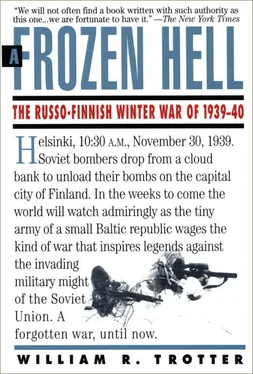The very sketchy evidence to emerge from post-Stalinist Russian sources suggests that Stalin was being urged to take quick action by the fire-breathing Andrei Zhdanov, political boss of Leningrad, and a clique of Leningrad District officers allied with him. This faction based its hasty and slipshod operational planning on two misconceptions: one being the belief that Finland did not have the capacity to offer more than token, face-saving resistance, and the other being the hoary Politburo delusion that the Finnish working class would rise up and paralyze its existing government, if not actually turn its guns on them, just as soon as the Red Army came across the border.
This wishful thinking was certainly reflected in official publications. A typical specimen is this excerpt from a 1938 edition of Kranaja Gazeta: “The Finnish Army, which for the most part is made up of peasants and workers, has no desire to pour out its blood for the benefit of landowners and the bourgeoise…. It is certain that if war broke out with the Soviet Union, the democratic elements of the population are ready to turn their weapons against the Fascists.” [3] Upton, Anthony F., Finland, 1939–1940 (Newark: University of Delaware Press, 1974), 45.
In a similar vein was a Tass report dated November 8, 1939, which stated that the families of Finland’s recently mobilized reservists were so poor that many of them had neither shoes nor adequate clothing for the coming winter.
Of course Stalin, like every other isolated head of state, depended on information fed to him by a network of subordinate agencies. With the purges still fresh in every bureaucrat’s mind, there was a natural tendency to tell Stalin what one supposed Stalin wished to hear. Certainly that was the case with the Russian minister in Helsinki, a servile party hack named Derevyanski, who appears to have been the source of many misconceptions about conditions inside Finland.
At the same time that Tass was reporting massive unrest among the Finnish proletariat, reports also began to appear in print citing “evidence” that “the Imperialists” were preparing to use Finland as a base for an invasion of the USSR. This was, and to a certain extent still is, the official justification given to the Soviet public for why the war was fought. It permitted the Kremlin to rationalize the apparent lunacy of a nation of 3.5 million souls attempting to invade a nation of 171 million. These claims also laid the groundwork for later explanations of the failed offensives and staggering casualties suffered by the Red Army. They could be explained away as being the result of Imperialist aid to the treacherous Finns.
The returning Finnish delegation barely had time to unpack its bags in Helsinki when word reached them that the Soviet press had unleashed a savage barrage of attacks on the Finnish government. The worst epithets were directed at Foreign Minister Erkko, who was vilified as a crowing rooster, a writhing serpent, and a phobic rat.
In its final report to the government, the Moscow delegation stated that there were three actions the Russians might take: they might do as Erkko suggested and simply abandon their claims; they might actually declare war; or they might do nothing and just wait for the international situation to move in one direction or another. “The first possibility seemed too good to be true; the second too terrible to contemplate; therefore, most people plumped for the third.” [4] Jakobsen, 140.
As the month of November drew to a close and no hostile Russian acts occurred, a wave of relief swept over Finland. Perhaps Erkko’s gamble had paid off after all. Schoolchildren and other evacuees returned to the cities and the border districts, and the government announced that schools would reopen on December 1. The popular mood was upbeat: Finland’s cause was so self-evidently just that surely the Western democracies would step in to devastate the Russians if they tried an attack.
It was touching, this inchoate faith in the national cause; it was also tragically deluded. When a delegation from the intensely patriotic National Coalition party visited Marshal Mannerheim in early November to ask for his views as Finland’s leading military figure, Mannerheim gave it to them straight. Stalin was not bluffing, he said. Russia, too, felt that its cause was just. The Red Army was no pushover, in spite of all the horror stories that had leaked out about the havoc wrought by Stalin’s purge of the officer corps. And as for the armed forces of Finland, the Marshal stated bluntly that their condition was critically deficient in every aspect except morale.
The politicians listened respectfully to Mannerheim, thanked him for his time, then left his office whispering among themselves that the Marshal was too old, too gloomy, too afraid of Russia, and too cautious for a proper Finn.
Mannerheim had only conveyed the essence of the uniformly grim reports that were reaching his desk. A sympathetic German military attaché warned that unless drastic moves were taken to reopen negotiations, his information indicated that soon “nothing might remain of Finland except a tale of heroism.” Intelligence reports and aerial reconnaissance photos gave indications of massive troop buildups in the Leningrad area and of hundreds of tanks, guns, and planes massed openly within easy range of the frontier. Less concrete, but just as alarming, were vague reports of new railheads and unpaved roads that dead-ended in the forests just a few kilometers east of the border. The Finnish Army had just received its first shipments of Bofors antitank guns from Sweden, enough to parcel out one or two guns per regiment, no more. The situation was equally serious with regard to antiaircraft weapons. Ammunition stocks for all calibers of weapons remained critically low. Trickles of some essential items were beginning to come in, but so slowly and so haphazardly that Mannerheim finally reached a decision he had been putting off for weeks: he could no longer accept responsibility for the defense of Finland.
On November 18, and again on November 26, Mannerheim appealed to Finland’s political leaders in a series of passionate and private discussions, begging them to reopen negotiations. “You must come to a diplomatic solution,” he urged; “the Army is in no condition to fight!” Again the politicians listened to the Marshal respectfully, and some even agreed with him, but Erkko’s ruling clique was puffed up by the belief that they had called the Soviet Bear’s bluff and gotten away with it. Mannerheim had voiced similar jeremiads many times before; for the moment, Finland’s ruling politicians saw no reason to budge. In disgust, Mannerheim tendered his resignation on November 27. President Kallio accepted it.
A couple of days earlier there had been a dinner meeting at the Kremlin; Khrushchev left a vivid account of it. In Stalin’s apartment for the occasion were Molotov, Zhdanov, and the old-guard Finnish Communist O. W. Kuusinen, whom Stalin had already picked as his puppet ruler of a Finnish People’s Republic. According to Khrushchev’s account, plans for the attack on Finland had already been completed: “The consensus of the group was that the Finns should be given one last chance to accept the territorial demands which they had already rejected during the unsuccessful negotiations. If they didn’t yield to our ultimatum, we would take military action. This was Stalin’s idea. Naturally, I didn’t oppose him.”
No one in the room even voiced the possibility that the war would be anything other than a walkover. “All we had to do was raise our voices a little bit,” remembered Khrushchev, “and the Finns would obey. If that didn’t work, we could fire one shot and the Finns would put up their hands and surrender. Or so we thought. When I arrived at the apartment, Stalin was saying, ‘Let’s get started today.’” [5] Crankshaw, ed., 152.
Читать дальше












